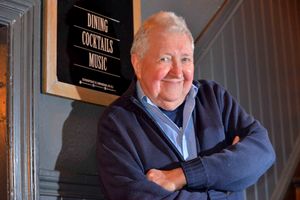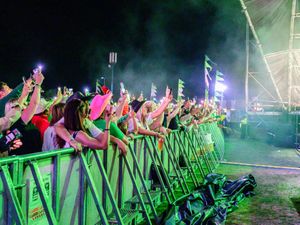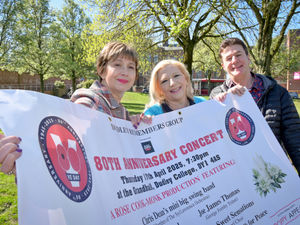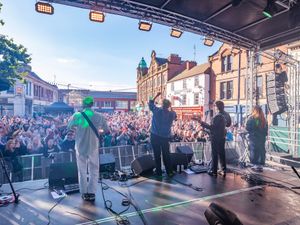Legendary blues club is back: Inside Henry's Blueshouse in Birmingham
It was where of some of the world's most well-known musicians honed their skills and where audiences developed a lifelong love of blues.

In the late 1960s, the legendary Henry's Blueshouse was the place to see the best up and coming singers and bands.
It also helped to launch the careers of the likes of Black Sabbath, Status Quo, Jethro Tull, Thin Lizzy, Robert Plant and Judas Priest.
The blues night was regularly championed by the late radio DJ John Peel who would often say on air that he was wearing his Henry’s t-shirt.
Described by Melody Maker as 'the first progressive music venue outside of London', it opened in small upstairs room at the Crown pub, on the corner of Hill Street and Station Street in Birmingham, in 1968.
Now after a break of more than 50 years, Henry's Bluehouse is being relaunched - this time at The Bulls Head in Bishopsgate Street.
Weekend spoke to Jim Simpson, who founded the famous music night and went on to manage Black Sabbath through the early years of their success, about it's return to the city.
"Henry's was a special place for blues fans. We had some fantastic blues musicians and American bluesmen. It was the place where many people heard blues for the first time and are still listening to it now," says trumpet player Jim, who is the managing director of Big Bear Records, which he also founded in 1968.
The opening of Henry’s Blueshouse at The Bulls Head is part of the events programme to celebrate the 50th anniversary of the independent record label, believed to be UK's longest established.
But the original night was started as a platform for band manager Jim to showcase the talents of his latest discovery - Bakerloo Blues Line.
He had founded and played in the band Locomotive, which had a hit record with Rudy’s In Love, but he left the group to become its manager.
"Rudy's in Love was the first ska hit in the country and I felt the band needed a manager.
Then when I left the band to concentrate on management, I found myself with my evenings free and that's when I found the band Bakerloo Blues Line.
"At this time, people weren't really looking to book blues bands. Every time you called a promoter, they would say 'it's not another blues band is it?'
"But this band were really good and I thought 'I've got to do something about it' and so I rented the upstairs room at The Crown to set up Henry's Blueshouse.
"Henry was actually a very glamorous Afghan hound that lived next door to me," explains Jim.
Admission to the venue in those days was about five shillings and there was also a membership scheme.
Support acts were usually paid from £5 with headline acts earning between £40 and £60.
Ahead of the opening night, Jim remembers worrying that nobody would show up and the 160-capacity would be empty but it turned out he had nothing to fear.
"I was panicking that nobody would come so I Ieafleted like mad. But that first night, we had to turn away more people than we had been able to let in. It was the best publicity you could have," he tells us.
Two people who signed up as members in those first weeks were guitarist Tony Iommi and singer John 'Ozzy' Osbourne who were playing in a band called Earth.
"One night they told me they had a band and asked if they could play in the intermission.
"They didn't want any money, they just wanted a Henry's t-shirt each.
"From that first show I knew there was something special about them," says Jim.
He was so impressed that he agreed to manage the band who changed their name to Black Sabbath and were gaining quite a following.
"After a while people kept asking 'when are Black Sabbath on next? We knew then we had something special then. There was nobody else who sounded like them, because their sound was unique," says Jim.
He took them from obscurity to the top of the charts with the single Paranoid and the albums Black Sabbath and Paranoid.
The latter reached number one on the album chart, a feat not repeated by the band until 43 years later.
"I still think they were their best albums," says Jim who lost the band to a London management group in the late summer of 1970.
Despite Sabbath's fearsome reputation, he says the band he knew were very serious and hard-working.
While Osbourne was a very different character to the outlandish lead singer we are all familiar with today.
"They would rehearse all the time and they took everything very seriously. We had business meetings at my house and we even took minutes.
"They were really nice lads. Ozzy was sometimes quiet and a bit lost about where to go vocally.
"He used to get ribbed a lot by the other lads in the band about being a singer, 'all you do is go out there and shout' they would tell him.
"I used to play him my record collection and try to instil a bit of confidence in him," recalls Jim, who is festival director of the Birmingham, Solihull & Sandwell Jazz Festival.
The original Henry's Blueshouse ran for three years with Jim saying he lost heart when Sabbath moved on and he went back to concentrating on his record label.
But during its heyday it saw many highly-respected American bluesmen grace the stage including Arthur Big Boy Crudup, who wrote That’s Alright Now Mama, the first Elvis Presley hit, Champion Jack Dupree, Lightnin’ Slim, Sonny Terry & Brownie McGhee, Reverend Gary Davis and J.B. Hutto.
Now he believes the time is right to start a new chapter in the story of Henry's Blueshouse.
"There is nothing quite like seeing blues live. I love its honesty, its anarchy, it's attitude. It evokes so many different emotions. I hope people come for the music," he says.
Henry's will also host screenings of blues films, sometimes blues talks and interviews as well as the occasional workshop, album or book launch.
"We want to teach people about the blues, where it comes from, so people know about it's roots. I hope it will inspire musicians and a new generation of blues fans. I can't wait, explains Jim.
Henry's Blueshouse relaunches at 7pm on Tuesday, March 5 and admission is free.
Headlining that night will be The Shufflepack with future acts including Brooks Williams, from Georgia, USA, Dirk Diggler’s Blues Revue, Bob Wilson & Honeyboy Hickling, The Whiskey Brothers and David Moore Blues Band.
Also, on the opening night blues journalist Stuart Constable will interview Jim Simpson about life at the early Henry’s, discovering Black Sabbath and working with American bluesmen.
As a bonus, any card-holding member of the original Henry’s Blueshouse gets a free drink of presentation of their membership card.
*See www.facebook.com/thebullsheadbrum





